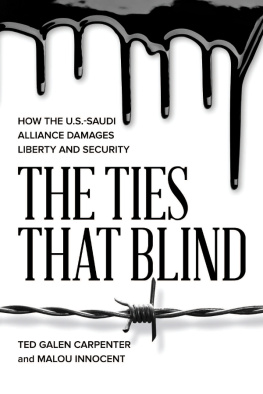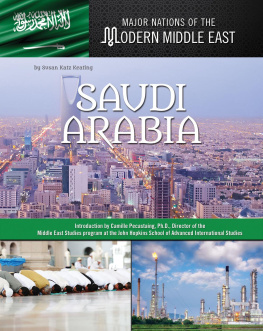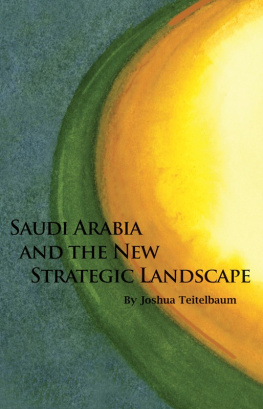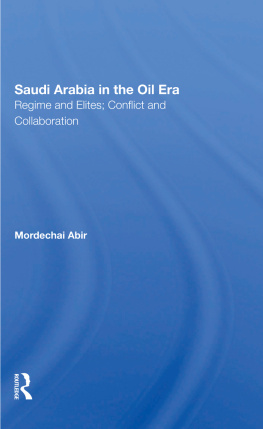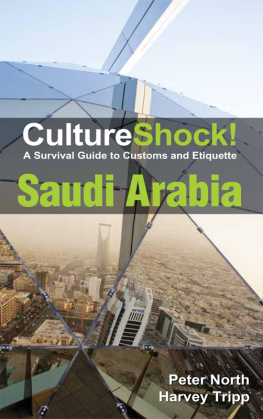

Copyright 2018 by the Cato Institute.
All rights reserved.
Content in this publication originally appeared in Perilous Partners: The Benefits and Pitfalls of Americas Alliances with Authoritarian Regimes , by Ted Galen Carpenter and Malou Innocent. Copyright 2015.
ISBN 978-1-948647-41-0 hardback
ISBN 978-1-948647-39-7 paperback
ISBN 978-1-948647-40-3 ebook
Cover design: Jon Meyers.
Printed in the United States of America.
C ATO I NSTITUTE
1000 Massachusetts Ave., N.W.
Washington, D.C. 20001
www.cato.org
Contents
Introduction: An Already Poisonous Relationship Gets Even Worse
The murder of Saudi journalist Jamal Khashoggi has cast a deep shadow over Washingtons close military and political relationship with Saudi Arabia. Riyadhs ever-changing story about how Khashoggi died undermines that governments already weak credibility, and it confirms the kingdoms well-deserved reputation for extreme human rights abuses. The account from Turkeys intelligence service of what happened after Khashoggi entered the Saudi consulate in Istanbulwith graphic descriptions of torture, murder, and possible dismembermenthas justifiably horrified populations and governments around the world.
Yet the Trump administrations initial reaction to the incident took the Saudi regimes explanations seriously and seemed designed to sweep the problem under the rug. Secretary of State Mike Pompeo paid an immediate visit to Riyadh for talks with Crown Prince Mohammed bin Salman, even though evidence already indicated that he was the person responsible for Khashoggis assassination. The meeting was cordial and indicated that the killing might become nothing more than a minor glitch in the longtime bilateral relationship. Only when evidence continued to mount about the Saudi regimes (and specifically, Bin Salmans) complicity, did the Trump administrations criticisms begin to sharpen.
The administrations initial reaction was indicative of the willingness of U.S. leaders throughout more than seven decades to overlook or even excuse Riyadhs execrable domestic and international conduct in order to preserve close ties. Washingtons solicitous, even enabling, posture toward Saudi Arabia cannot disguise the fact that the kingdom has never been a reliable U.S. ally. Indeed, it has been a thoroughly duplicitous one. Continuing to collaborate with that country cannot be justified even on strategic grounds. It certainly cannot be justified on moral grounds.
Khashoggis murderas appalling as it wasis hardly the only instance of Riyadhs violent elimination of regime critics. On January 2, 2016, the government executed prominent Shiite cleric Nimr Baqir al-Nimr for alleged terrorist activities. Indeed, Nimr may have been the most prominent critic of the royal family to be expunged before the Khashoggi episode. In addition to executing Nimr, the government also had sentenced to death his 17-year-old nephew, Ali Mohammad Baqir al-Nimr, for daring to participate in pro-democracy demonstrations that the Arab Spring had spawned throughout the Middle East. Only a concerted international campaign has caused the Saudi government to refrain from executing the incarcerated younger Nimrso far.
Numerous opponents who are less renowned have not been so lucky. Indeed, Riyadhs per capita use of capital punishment rivals only that of China and Iran. The regime executed 146 people in 2017 and is on pace for a similar total in 2018. Although some of the individuals were accused of murder and similar heinous crimes, others clearly were silenced political dissenters. Indeed, several of the victims in recent years were people who merely participated in the Arab Spring pro-democracy demonstrations or who dared to criticize regime policies. Moreover, in addition to such political crimes, capital offenses in Saudi Arabia include adultery, atheism, sorcery, and witchcraft.
Khashoggis murder merely illustrates the kingdoms extensive record of human-rights abuses and outright war crimes. The latter is apparent in the way Riyadh has conducted the war in Yemen. There is abundant evidence of multiple atrocities that Riyadh and its United Arab Emirates (UAE) junior partner have committed and continue to commit in that conflict.
Yet, incredibly, just weeks after that horrific incident, Secretary Pompeo certified that Saudi and UAE forces were making a reasonable attempt to avoid inflicting harm on civilians.
Unfortunately, Washington has been deeply involved in assisting the Saudi war effort since Riyadh initiated its intervention in the spring of 2015. American defense firms (with the U.S. governments blessing) supply coalition forces with most of the bombs and missiles that it uses in the Yemen conflict. In addition, the United States actively assists the war effort by giving key military intelligence to Saudi and UAE forces and refueling coalition combat aircraft.
Washington offers two justifications for providing such support. One is that Saudi Arabia and its partners are merely responding to Irans previous interference in Yemen, whereby Tehran is attempting to install its Shiite co-religionists, the Houthis, in power. Credible experts have effectively debunked that rationale, pointing out that Yemens internal factionalism long predated any moves by Tehran; Irans meddling before the Saudi-led intervention was minimal; and there are major differences, both in religious doctrine and political objectives, between the Houthis and the Iranians. Moreover, even if Iran has interfered in Yemens internal affairs, that action did not justify the much larger, more brazen, Saudi interventionmuch less justify the accompanying and ever-worsening list of war crimes.
The second justification that terrorist groups, especially al Qaeda in the Arabian Peninsula (AQAP), have infiltrated Yemendoes not hold up much better. Houthi and AQAP forces have clashed on numerous occasions. That development is not surprising, because al Qaeda is a staunchly Sunni Muslim organization, whereas the Houthis are at least a Shiite offshoot. By supporting Riyadhs crusade against the Houthi faction, the United States actually is helping to weaken one of AQAPs principal adversaries.
If Saudi Arabia were truly an essential and loyal U.S. ally, a plausible argument could be made that Americans would just need to hold their collective noses about the regimes moral outrages and preserve the alliance in the name of defending vital American security interests.
There have been times when even ethical, democratic societies have had to submerge their moral qualms when vital security interests were at stake. Thus, during World War II, the governments of the United States and Great Britain were willing to forge the Grand Alliance with Joseph Stalins Soviet Union, one of the most brutal, repulsive political systems in modern history. The alternative seemed to be the risk of defeat at the hands of Nazi Germany and its allies.
But such truly existential threats are rare. Unfortunately, U.S. leaders both during and after the Cold War have been much too willing to make moral compromises when the interests at stake are far more modest. Abandoning essential moral standards and values for the defense of lesser interests is never justified. Yet that is what the United States has done regarding its relationship with Saudi Arabia for decades.
The extent of genuine American interests in the Middle East is debatable. Defenders of Washingtons longstanding relationship with Saudi Arabia (and other authoritarian Middle Eastern countries) contend that protecting a cheap and reliable oil flow from the region is essential to the global economy. As discussed in the original chapters from my 2015 book Perilous Partners , that justification was exaggerated even when Washington feared that its superpower adversary might gain control over the oil supply. But such a (remote) possibility disappeared when the Soviet Union dissolved at the end of 1991. With the emergence of significant producers in other regions and the dramatic boost in Americas own output, that rationale now lacks all credibility.

